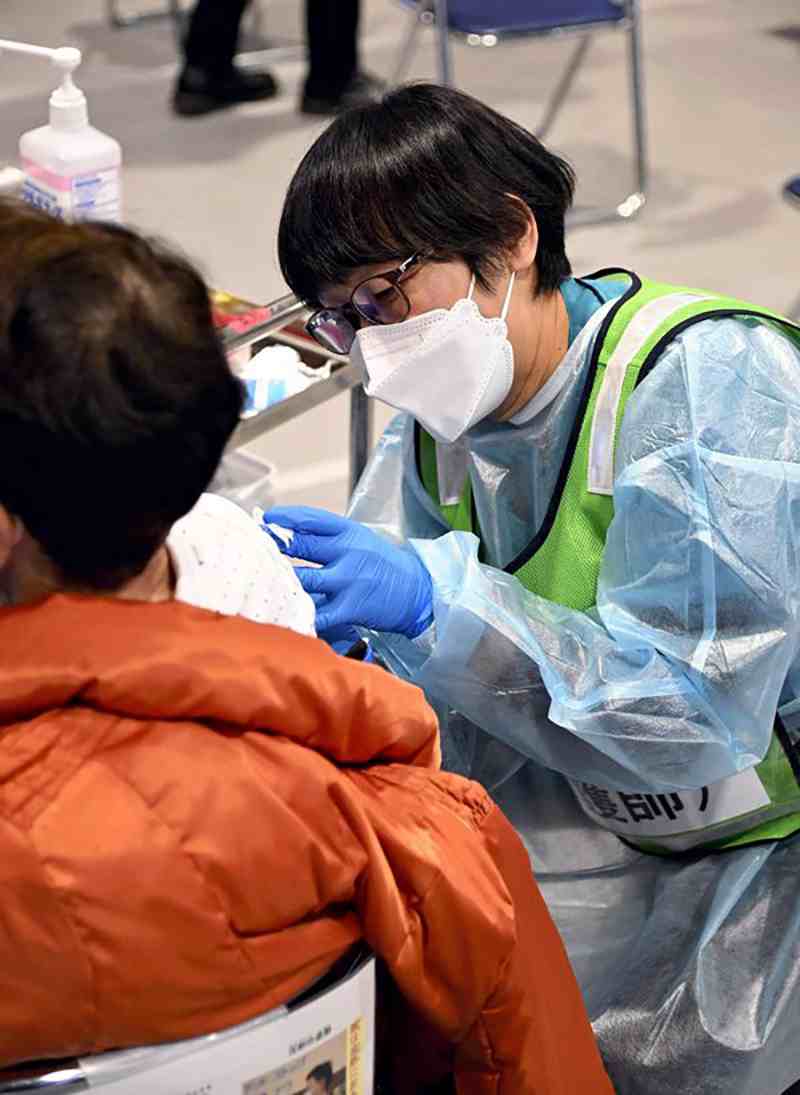
Nurse Akemi Marui administers a vaccine in Komae, Tokyo, on Feb. 11.
9:47 JST, March 4, 2022
The government is taking steps to encourage former nurses — said to number about 710,000 nationwide — to return to work, in a bid to alleviate the labor shortage caused by the coronavirus pandemic.
Last year, the government approved the dispatch of nurses to vaccination sites and temporary medical facilities through staffing agencies, and more than 20,000 nurses have since been assigned to inoculation venues. With an eye on the post-COVID-19 era, the government has also begun to systemize the return of former nurses through the My Number system.
First time in 20 years
Nurse Akemi Marui tried to ease the fears of elderly people at a vaccination venue in Komae, Tokyo, where booster shots were being administered at a rapid pace on Feb. 11. “Please tell me if your fingers go numb when you get the shot,” said Marui, 56, who lives in Kawasaki.
Last April, when vaccinations were expected to be in full swing, the government amended an ordinance of the Law on Securing the Proper Operation of Worker Dispatching Businesses and Protecting Dispatched Workers to allow nurses to be dispatched through staffing agencies.
Marui, who stopped working as a nurse when she had a child about 20 years ago, registered with a temporary staffing agency to help with the shortage of nurses caused by the pandemic. The flexibility to choose the days and hours she wanted to work also encouraged her to return to work.
At first she worked two days a week, but now she works five days a week at venues in Tokyo and Kanagawa Prefecture. In Komae, Marui is in charge of vaccinating 150 to 160 people a day. She said, “After my long time away, I felt uneasy [at first], but now I feel it is worthwhile.”
Locating nurses
As of 2019, there were approximately 1.27 million qualified nurses working in the medical field. According to the Japan Federation of Medical Worker’s Unions, many people have left their jobs due to the intense workload during the pandemic, and there are facilities where more than 50 people, including nurses, have left their jobs since April 2021.
In contrast, about 25,000 nurses like Marui have been dispatched to vaccination sites through staffing agencies. In January this year, following the spread of the omicron variant, the government also approved the dispatch of nurses to temporary medical facilities that accept COVID-19 patients with minor symptoms.
However, these are special measures to cope with the urgency of the coronavirus outbreak. To be able to cope with new epidemics of infectious disease, the government is working on a system to support the return to work of former nurses by utilizing Mynaportal, a dedicated website for My Number personal identification cards, and the national qualification management system that is scheduled to be operational in fiscal 2024.
First, the government will ask potential nurses to enter their qualifications on Mynaportal, where their names and addresses are registered, and link them to the qualification information in the national qualification management system. Then, nurse centers in the prefectures will provide information on job openings and training schedules to those who wish to receive such information through Mynaportal.
With this system, it will be possible to contact potential nurses, whose whereabouts were previously difficult to ascertain, and effectively encourage them to return to work.
Eliminate concerns
However, even if the My Number system can be used to reach out to potential nurses, there are still issues that need to be addressed before they can return to the workforce.
According to the Japanese Nursing Association, prefectural nurse centers already provide regular training for former nurses to help them return to work, and counselors at local employment service centers provide support.
However, it is believed to often be difficult to find work, as many of the job offers are for full-time positions.
According to Yukie Takemura, an associate professor of nursing administration at the University of Tokyo: “To encourage former nurses to return to the workforce, it is essential to make efforts to alleviate their concerns by providing meticulous support, such as training in recent nursing techniques and establishing work conditions that suit their family circumstances. Nurses also need to be aware that their qualifications are a social resource.”
Top Articles in Society
-

Man Infected with Measles Reportedly Dined at Restaurant in Tokyo Station
-

Man Infected with Measles May Have Come in Contact with Many People in Tokyo, Went to Store, Restaurant Around When Symptoms Emerged
-

Woman with Measles Visited Hospital in Tokyo Multiple Times Before Being Diagnosed with Disease
-

Australian Woman Dies After Mishap on Ski Lift in Nagano Prefecture
-

Foreign Snowboarder in Serious Condition After Hanging in Midair from Chairlift in Nagano Prefecture
JN ACCESS RANKING
-

Japan PM Takaichi’s Cabinet Resigns en Masse
-

Japan Institute to Use Domestic Commercial Optical Lattice Clock to Set Japan Standard Time
-

Israeli Ambassador to Japan Speaks about Japan’s Role in the Reconstruction of Gaza
-

Man Infected with Measles Reportedly Dined at Restaurant in Tokyo Station
-

Videos Plagiarized, Reposted with False Subtitles Claiming ‘Ryukyu Belongs to China’; Anti-China False Information Also Posted in Japan























